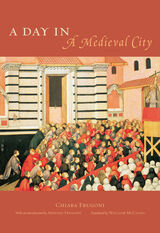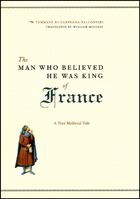2 books about McCuaig, William

A Day in a Medieval City
Chiara Frugoni
University of Chicago Press, 2005
An opportunity to experience the daily hustle and bustle of life in the late Middle Ages, A Day in a Medieval City provides a captivating dawn-to-dark account of medieval life. A visual trek through the thirteenth and fourteenth centuries—with seasoned historian and expert on medieval iconography Chiara Frugoni as guide—this book offers a vast array of images and vignettes that depicts the everyday hardships and commonplace pleasures for people living in the Middle Ages.
A Day in a Medieval City breathes life into the activities of the city streets, homes, fields, schools, and places of worship. With entertaining anecdotes and gritty details, it engages the modern reader with its discoveries of the religious, economic, and institutional practices of the day. From urban planning and education to child care, hygiene, and the more leisurely pursuits of games, food, books, and superstitions, Frugoni unearths the daily routines of the private and public lives of citizens. A Day in a Medieval City is a charming portal to the Middle Ages that you'll surely want with you on your travels to Europe—or in your armchair.
A Day in a Medieval City breathes life into the activities of the city streets, homes, fields, schools, and places of worship. With entertaining anecdotes and gritty details, it engages the modern reader with its discoveries of the religious, economic, and institutional practices of the day. From urban planning and education to child care, hygiene, and the more leisurely pursuits of games, food, books, and superstitions, Frugoni unearths the daily routines of the private and public lives of citizens. A Day in a Medieval City is a charming portal to the Middle Ages that you'll surely want with you on your travels to Europe—or in your armchair.
“With its color illustrations of rare paintings and artifacts, this thoughtful and informative, elegantly fashioned excursion into the life of a medieval city is a veritable feast of information and visual delights. Frugoni is a marvelously experienced historical travel guide.”—Choice
“Stunningly beautiful . . . and a good read as well. . . . It’s amazing how much wealth of detail and image Ms. Frugoni has packed into this delightful, relatively small book.”—Steve Goode, Washington Times
“Charming and insightful. . . .Written with exceptional grace and infused with a warm sense of humanity.”—Library Journal
“Stunningly beautiful . . . and a good read as well. . . . It’s amazing how much wealth of detail and image Ms. Frugoni has packed into this delightful, relatively small book.”—Steve Goode, Washington Times
“Charming and insightful. . . .Written with exceptional grace and infused with a warm sense of humanity.”—Library Journal
[more]

The Man Who Believed He Was King of France
A True Medieval Tale
Tommaso di Carpegna Falconieri
University of Chicago Press, 2008
Replete with shady merchants, scoundrels, hungry mercenaries, scheming nobles, and maneuvering cardinals, The Man Who Believed He Was King of France proves the adage that truth is often stranger than fiction—or at least as entertaining. The setting of this improbable but beguiling tale is 1354 and the Hundred Years’ War being waged for control of France. Seeing an opportunity for political and material gain, the demagogic dictator of Rome tells Giannino di Guccio that he is in fact the lost heir to Louis X, allegedly switched at birth with the son of a Tuscan merchant. Once convinced of his birthright, Giannino claims for himself the name Jean I, king of France, and sets out on a brave—if ultimately ruinous—quest that leads him across Europe to prove his identity.
With the skill of a crime scene detective, Tommaso di Carpegna Falconieri digs up evidence in the historical record to follow the story of a life so incredible that it was long considered a literary invention of the Italian Renaissance. From Italy to Hungry, then through Germany and France, the would-be king’s unique combination of guile and earnestness seems to command the aid of lords and soldiers, the indulgence of inn-keepers and merchants, and the collusion of priests and rogues along the way. The apparent absurdity of the tale allows Carpegna Falconieri to analyze late-medieval society, exploring questions of essence and appearance, being and belief, at a time when the divine right of kings confronted the rise of mercantile culture. Giannino’s life represents a moment in which truth, lies, history, and memory combine to make us wonder where reality leaves off and fiction begins.
[more]
READERS
Browse our collection.
PUBLISHERS
See BiblioVault's publisher services.
STUDENT SERVICES
Files for college accessibility offices.
UChicago Accessibility Resources
home | accessibility | search | about | contact us
BiblioVault ® 2001 - 2024
The University of Chicago Press









